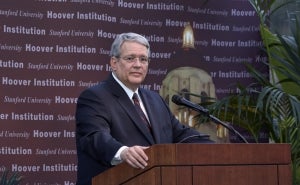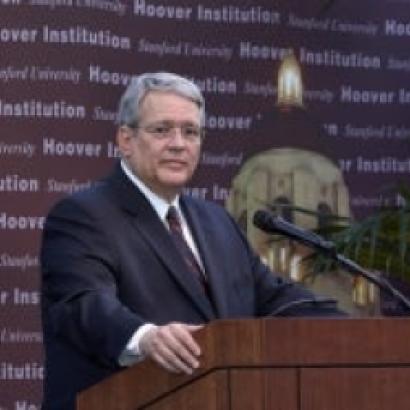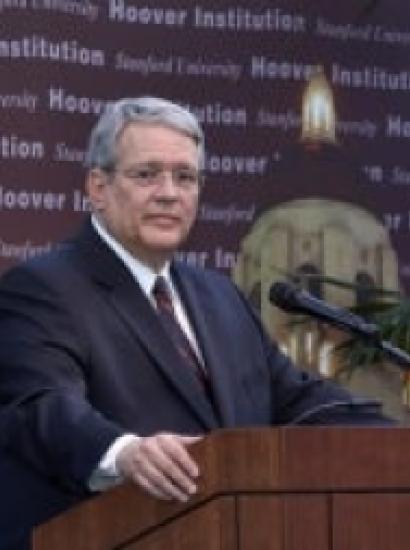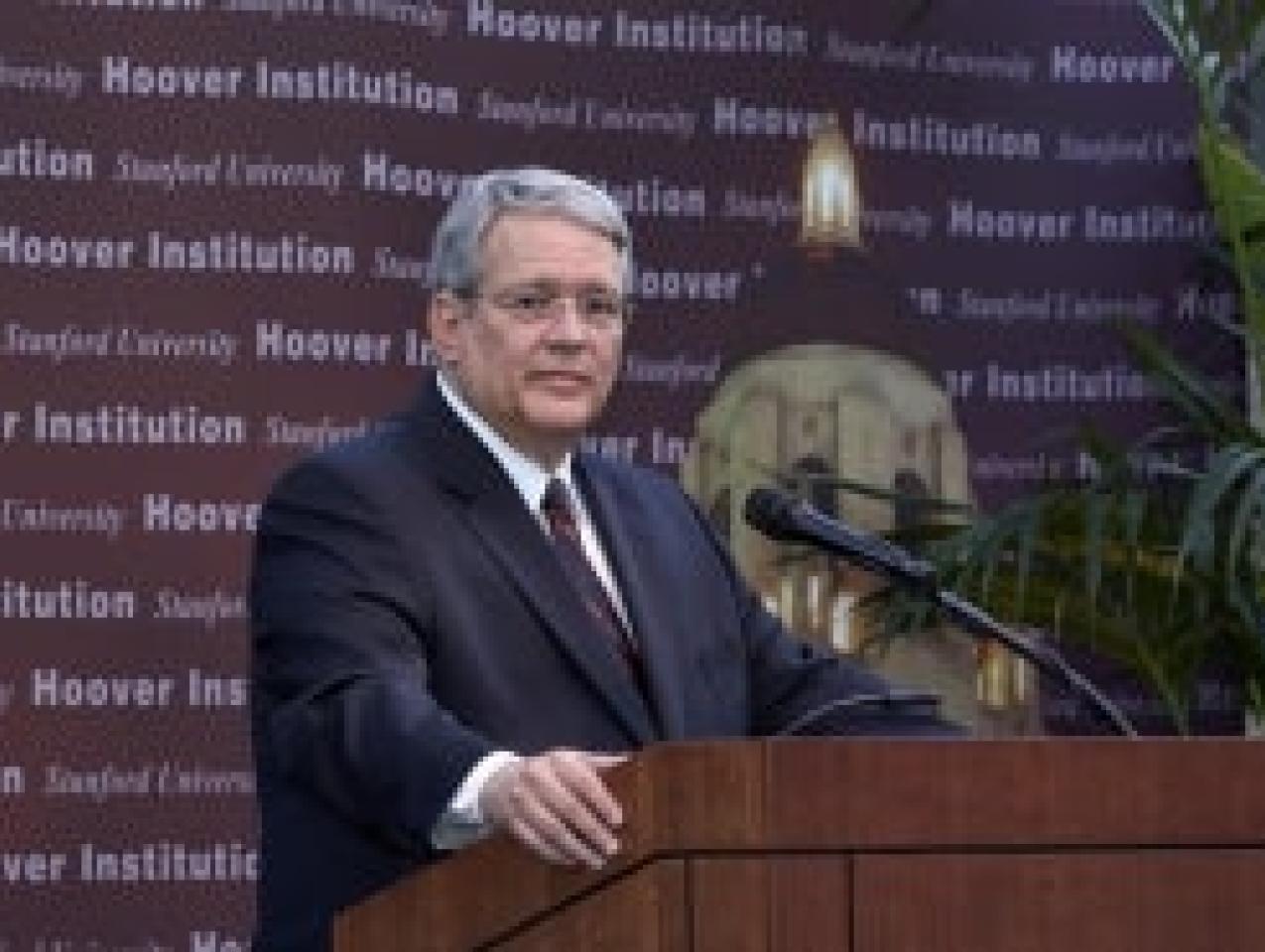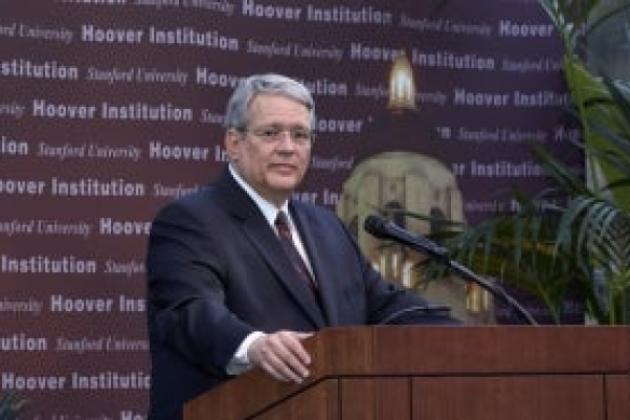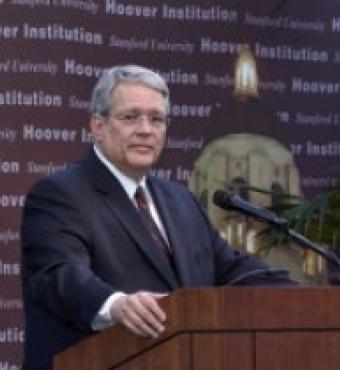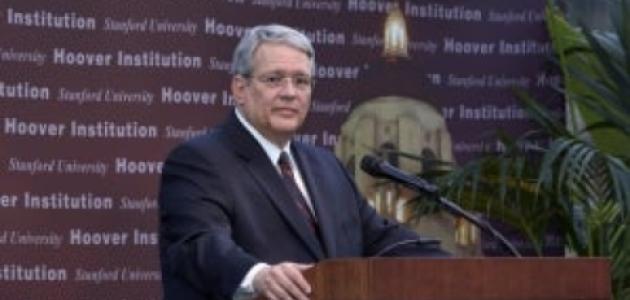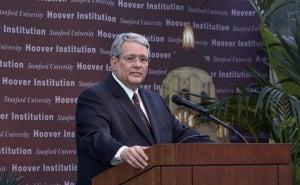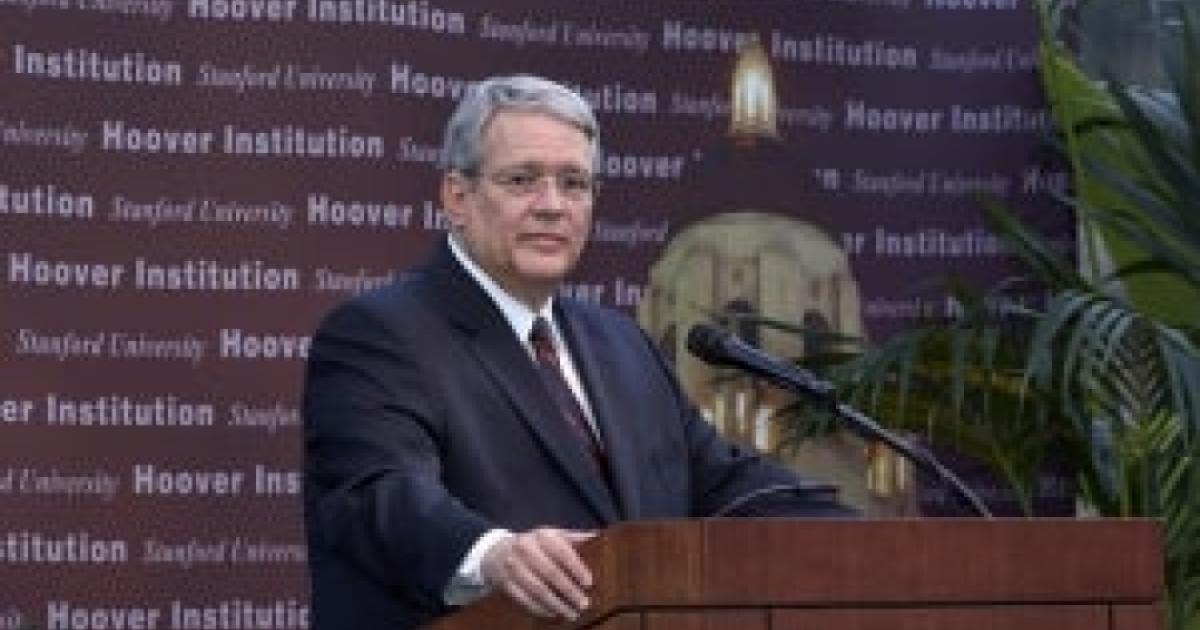The Hoover Institution hosted its annual Board of Overseers’ summer meeting during July 9–11, 2013.
The program began on Tuesday evening with before-dinner remarks by Paul D. Clement, a partner at Bancroft PLLC. Clement served as the forty-third solicitor general of the United States from June 2005 until June 2008, and he has argued more than sixty-five cases before the US Supreme Court. During Clement’s speech, titled “Federalism in the Roberts Court,” he talked about the revitalization of federalism in the Rehnquist court “imposing some limits on the federal government’s power vis-a-vis the states.” After Chief Justice Rehnquist and Justice O’Connor stepped down from the Supreme Court, President Bush appointed Chief Justice Roberts and Justice Alito. Clement discussed how Rehnquist and O’Connor “essentially cut their teeth in the state government” and that Roberts and Alito have experience in the federal government. “It is not obvious that these justices are going to have the same sensitivity to federalism as the justices they replaced,” said Clement. He touched on two significant decisions from this current Supreme Court term, including the Shelby county case (constitutionality of the Voting RightsAct) and the Windsor vs. United States case (constitutionality of the Defense of Marriage Act). He identified three similarities between the cases: First, that it is difficult to identify the “precise reasoning or holding of either of these cases.” Second, that Justice Kennedy is the only justice who thought both cases were correctly decided; every other justice thought one case was incorrectly decided. Third, that “Federalism was a critical aspect of the Court’s reasoning and the Court’s decision.”
John Raisian, the Tad and Dianne Taube Director of the Hoover Institution, gave opening remarks on Wednesday morning, during the full board briefing, emphasizing his “institutional vision” for the future and stressing Hoover’s successful characteristics. “We have great intellectual capital, great new leadership at the senior staff level, great ideas to address the many policy challenges facing America, great strategies for enhancing our position as an elite idea generator and communicator, unique institutional characteristics relative to our peers, and a great mission of seeking peace and prosperity based on a foundation of economic, political, and social freedom.” He went on to discuss the development of facilities, assembling new research teams, expanding communications, and the importance of interdivisional productivity. Raisian then introduced the new Library and Archives director, Eric Wakin.
Eric Wakin, associate director, research fellow, and the new director of the Hoover Institution Library and Archives, spoke about his background and experience in three sectors, including the special collections world of archives and libraries, academia, and the private sector. Before coming to Hoover, Wakin was the Herbert H. Lehman Curator for American History and the curator of manuscripts at the Rare Book & Manuscript Library at Columbia University, where he also taught courses in the History Department on public history, memory and narrative, archives and knowledge, and theory. “As a historian, I have a deep respect for the collections here and what Hoover has meant to scholarship in my lifetime, especially on the Cold War and to what [he calls] the life of the mind: that the collections here are connected to real life,” stated the new director.
Eryn Witcher, associate director and the Bechtel Director of Public Affairs at the Hoover Institution, talked about the office of public affairs. She described the impact of the “big tool box,” which includes media outlets such as radio, television, Facebook, and Twitter, using videos to demonstrate the success of those outlets. The first video, titled “The Economy and the Budget,” featured Hoover fellows Joshua Rauh, Russell Roberts, David Davenport, John Taylor, and Michael Boskin. The second video, titled “Immigration,” featured the following Hoover fellows on various television programs: Edward Lazear, Lanhee Chen, and Clint Bolick. The final video included Hoover fellows Condoleezza Rice, Admiral Gary Roughead, Kori Schake, Fouad Ajami, Kiron Skinner ,and George P. Shultz on “US Foreign Policy.”
Chris Dauer, director of marketing and strategic communications at Hoover, discussed how Hoover uses direct communication products in to reach a broader audience. He emphasized the importance of effectively articulating our ideas to expand reach and improve accessibility. He showed a new video series, produced by the Hoover Institution and 92nd Street Y (92Y), “American Conversation Essentials,” which features Hoover fellows discussing topics ranging from education to the civil rights movement. Dauer also talked about the recently produced Strategika, an online journal that analyzes ongoing issues of national security in light of conflicts of the past put out by the Military History Working Group: historians, analysts, and military personnel who focus on military history and contemporary conflict.
Richard Sousa, senior associate director at the Hoover Institution and a research fellow, introduced the Wednesday afternoon speakers.
John Taylor, the George P. Shultz Senior Fellow in Economics at the Hoover Institution and the Mary and Robert Raymond Professor of Economics at Stanford University, gave a talk titled “What’s Happening with Fed Policy and the Markets?” Taylor spoke about the lack of improvement of the economy in the last four years and how the “unwinding of these actions causes uncertainty” for the future of the economy. “At the very basic level, the Fed has morphed from a limited-purpose institution to a multipurpose institution, terms that George Shultz uses a lot. The limited-purpose institution focuses on price stability and overall economic stability, whereas a multipurpose institution, where it is now, can and does intervene in just about any market it wants to,” stated Taylor. Using charts to explain the conventional and unconventional monetary policy showing the equity rate variables, Taylor emphasized the need to get the economy moving, produce more jobs, and get the unemployment rate down.
Russell Roberts, the John and Jean De Nault Research Fellow at the Hoover Institution, talked about education in his speech titled “The Changing Landscape of Education.” Roberts discussed the impact that the Internet has on education and the way people learn things. He mentioned two developments that have a significant influence on education: podcasts, which he described as an audio file on the Internet, and MOOCs (Massively Open Online Courses). Since 2006, Roberts has hosted a podcast called Econtalk in which he interviews various types of people and topics. He explained how podcasts can be accessed through iTunes and how easy it is to learn about anything; people listen to podcasts while they exercise, commute to work, walk their dog, and do the dishes. Some people even feel like they are receiving a college education by listening to Econtalk. Podcasts are a revolutionary way to get more people involved in education. In 2011, Stanford professors Sebastian Thrun and Peter Norvig wanted to teach a course on artificial intelligence and decided to put it online. The enrollment quickly reached 160,000 students. Although the dropout rate was high (137,000 people), 23,000 people completed the requirements of the course; 238 received a perfect score. This shows how MOOCs can reach a much larger audience and how more people around the world can get an education. Roberts also discussed the pros and cons of MOOCs. Their visual aids can reach a large audience, including those who cannot make it to the classroom; one can stop/rewind the video, and great talent can reach more people. The critics however, ask who is paying attention to the video the entire time, how can great numbers of students be graded, and who is recording all these statistics. Roberts concluded by showing how audio and visual aids can increase our educational capacity around the world.
Victor Davis Hanson, the Martin and Illie Anderson Senior Fellow at the Hoover Institution, talked about his most recent publication, The Savior Generals: How Five Great Commanders Saved Wars That Were Lost: From Ancient Greece to Iraq in his speech titled “Saving Lost Wars.” Hanson spoke about what makes leaders successful or unsuccessful. He explains how he was trying to do something different, not just find the losers or winners of history. “What would a criteria of leadership [be] when everything was against you? In other words, you were put in charge of a war that was being lost and you were not responsible for this loss,” asked Hanson. He talked about five generals (which he also mentions in his book), Themistocles, Belisarius, Sherman, Ridgway, and Petraeus, pointing out their commonalities and leadership profiles. Hanson discussed how these generals saved their nations from defeat in war, saying that the process was unpredictable.
Victor Davis Hanson on “Saving Lost Wars”
Fouad Ajami, the Herbert and Jane Dwight Senior Fellow at the Hoover Institution and the cochair of the Herbert and Jane Dwight Working Group on Islamism and the International Order, and Charles Hill, a research fellow at the Hoover Institution and cochair of the Herbert and Jane Dwight Working Group on Islamism and the International Order, addressed the Middle East in their talk titled “The Vanishing Red Lines: The Middle East in the Obama Era.” Hill explained why it is important to care about the Middle East, including how “the West” is coming to a “modern age” and the “struggle to hold that radical tide back,” referring to the 1960 cultural and social upheaval. He discussed four pillars of the modern age: the Renaissance, the Reformation, Enlightenment, and the creation of international systems. Ajami began by highlighting two new publications: Syria, Iran, and Hezbollah: The Unholy Alliance and Its War on Lebanon, by Marius Deeb, and Motherland Lost: The Egyptian and Coptic Quest for Modernity, by Samuel Tadros. He continued by explaining how Egypt is “in the wind, in pain, and in the crossroads.” The people of Egypt are beginning Ramadan, but it is not a pleasant time there this year; The Egyptian army controls 30 percent of GDP, and the police force is corrupt. He also discussed the Muslim Brotherhood, the celebrants around Egypt, and the dejected places after the regime of the fifth president of Egypt, Mohamed Morsi.
Fouad Ajami and on Charles Hill on
“The Vanishing Red Lines: The Middle East in the Obama Era”
George P. Shultz, the Thomas W. and Susan B. Ford Distinguished Fellow at the Hoover Institution, where he chairs the Shultz-Stephenson Task Force on Energy Policy and is a member of the Working Group on Economic Policy, gave before-dinner remarks on Tuesday evening. His speech, titled “A Constructive Agenda,” presented four ideas. First, he discussed how our world has gone from security and economic commons to a world awash in change, including its demography. Shultz talked specifically about China and Africa and the labor force and infertility. He emphasized how terrorism has had a huge impact on us as a nation. Second, he emphasized how we can put the pieces back together in the energy field, including the work he is doing with Tom Stephenson and the Shultz-Stephenson Task Force on Energy Policy. The third idea was the idea of North America having had a “gradual explosion,” increasing the number of imports rather than exports. He also addressed other problems affecting North America, including the Mexico/Central American border, K–12 education, and the war on drugs. The fourth idea involves governing, using Chinatown in San Francisco as an expression of diversity and how places such as Chinatown are an integral component of a successful environment and government. “The problem of governing over diversity is a key issue to face,” Shultz stated.
George Shultz on “A Constructive Agenda”
The Thursday morning speakers included special presentations by Peter Berkowitz, George P. Shultz, and James N. Mattis.
Peter Berkowitz on
“Alexander Hamilton, James Madison, and John Jay: Then and Now”
In a talk titled “Alexander Hamilton, James Madison, and John Jay: Then and Now,” Peter Berkowitz, the Tad and Dianne Taube Senior Fellow at the Hoover Institution, discussed The Federalist, the great work of those three men. Citing recent examples of constitutional ignorance among our leaders and the failure of universities to teach The Federalist, Berkowitz explained why this series of essays, written in 1787-88 to promote the ratification of the Constitution, is important and should be studied. Explaining that the Constitution was based on a proper understanding of human nature, the authors of The Federalist demonstrated that the Constitution secured civil liberty better than the prevailing charter of government. Berkowitz also discussed the fundamental moral and political premises of The Federalist: that human beings are free and equal; that legitimate government is based on the consensus of the governed; and that the purpose of government is to secure the rights of its citizens. He then spoke about the institutional mechanisms the Constitution uses to secure the principle of liberty. A specialist in constitutional government, conservatism and progressivism in the United States, and liberal education, among other things, Berkowitz recently authored Constitutional Conservatism: Liberty, Self-Government, and Political Moderation.
George P. Shultz, the Thomas W. and Susan B. Ford Distinguished Fellow at the Hoover Institution, gave introductory remarks on Thursday morning highlighting the illustrious career of James N. Mattis.
Mattis, a US Marine Corps general who retired in May 2013 after more than forty-one years of service, talked about the tumultuous regions of the Middle East and Africa including countries such as Egypt, Sudan, Ethiopia, Somalia, Rwanda, Israel, Saudi Arabia, Iran, Iraq, and Afghanistan. Mattis talked about three anchors that keep us in these regions. These anchors include oil, Israel, and violent extremists. He mentioned two brands of violent extremists including the Shittes (Lebanese Hezbollah) and the Sunni (Wahhabi). Mattis also discussed the Arab Spring, the role of Iran, and Afghanistan. Mattis focused on the role of Iran because he thinks that “it is the single biggest threat to regional stability.” Mattis continued, “From a military point of view, there are basically five threats [including] counter-maritime, ballistic missile, cyber, terrorism, and the latent threat of a nuclear program.” He concluded by discussing the strategy in Afghanistan and the number of high-spirited troops who represent the United States.






